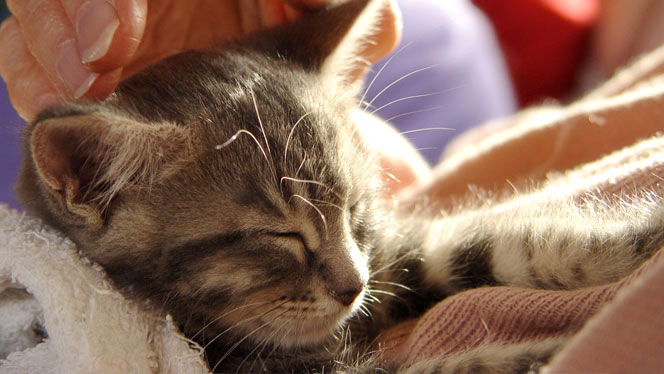Is a pet for your parent a good idea?

Pets are often recommended as good companions for the lonely or housebound. What are the pros and cons of pet ownership as your parents grow frailer, and how can you help them to ensure their pet continues to be cared for, however circumstances change?
For parents who are lonely or socially isolated, keeping a pet has been shown to have all sorts of mental, emotional and physical health benefits. They encourage social interaction – bridging the gap between young and old. They’re a responsibility and routine setter – something for an elderly person to get up for in the morning. They’re also a source of entertainment and unconditional love. Research has shown that animal companionship can dramatically improve quality of life and may even have a positive impact on longevity.
What sort of pet?
Your parent will have a view on whether they would like a pet or not, and what they would be comfortable with.
You don’t always have to match a pet to suit your parent’s abilities. Fitter and recuperating parents will benefit from exercising a dog but that doesn’t mean a frailer parent shouldn’t have a dog also. Safer Pets offer advice on what to consider when choosing a dog for your parent as well as a list of dogs suitable for elderly owners.
If your parent feels they can manage a puppy, the Association of Pet Dog Trainers (APDT) provides advice on what to look for when choosing a trainer and you can search for approved APDT trainers here.
Day-to-day costs
Pet bills can mount up. As well as food and vet bills, there could be costs involved in boarding houses, dog walkers and pet sitters. Time might not be so big an issue for a parent whose retirement may be enhanced by a furry friend but if you’re not covering the cost of their pet it could be eating into their pension!
Pet health insurance is one part of the costs that can be particularly confusing. There are many different types depending on the kind of pet your parent owns and often the more comprehensive the insurance, the more expensive it’s likely to be.
Sometimes slightly more expensive insurance is best as it covers things like boarding fees should your parent go into hospital. MoneySupermarket offers a guide to pet health insurance detailing the ins and outs of pet policies for those of us who’re having a hard time getting our heads round the different plans.
When pet care starts to get more difficult
Dog walkers and regular pet sitters are a way of making sure your parent continues to benefit from the company of their pet without the worry of caring for their everyday needs.
There are many people offering these services locally, and it’s worth taking time to check that they are reliable, responsible and insured.
Animals at Home is just one of many pet care services that offers in home care for your parent’s pet. With any pet care agency it’s worth asking to see their credentials to ensure peace of mind when choosing the right provider.
If your parent is already receiving care services for themselves at home you may find that pet care is one of the options offered by their agency.
While your parent is away
Should your parent go into hospital and you, a friend or neighbour, aren’t around to look after their pet, what else can be done to make sure their animal is properly cared for? As well as pet sitters you could contact your parent’s local kennel or cattery to check accommodation availability and comparative prices.
You could also ask the local vets for their help.
The longer term
If your parent’s trip to the hospital is a sign they’re heading for a nursing home, it’s possible that they can take their pet with them, as long as it’s reasonably small and continent!
To find a pet friendly care/nursing home local to you or your parent click here. The Cinnamon Trust also offers a Pet Friendly Care Homes Register which provides a comprehensive list of homes that allow pets. Sheltered housing might be more of a problem – some are still overburdened by the anxieties of health and safety issues and will simply not allow pets.
Your parent may have a nagging worry about what will happen to their pet if they can no longer look after them. Will family or friends be able to take them on? What happens to their pet when they pass away?
The Cinnamon Trust can help reduce some of the costs of pet care whilst ensuring that your parent’s pet continues to be cared for after they’ve gone. An arrangement between your parent and the Trust can be made in advance to safeguard their pet’s future without them.
A similar legal agreement can be made with the RSPCA’s Home for Life service which promises to find a loving home for your parent’s pet once they’ve gone.
A pet may be just the right prescription for your parent but on the other hand it might simply be a pain and a worry! The costs of keeping a pet of course factor into the decision of your parent buying one but ultimately you must ask the question would your parent enjoy a pet? If the answer is yes it may just be the health boost they need to keep them at home for longer – well, happy and loved.
Find out more about how to help your parent avoid social isolation by downloading our “How to” guide on loneliness.

